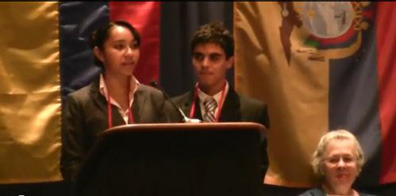Change remains the byword as the Episcopal Church’s eight-day 77th General Convention winds down today. Generational change, technological change, fiscal and structural change, international change, liturgical change, and more: these dynamics are in much in play as the church moves forward locally, regionally and globally.
And it is change for the best: one senses that there is true readiness and great good will across the church for meeting the challenges and maximizing the possibilities posed by such far-reaching progress. Indeed, there is a strong sense of working together at this Convention meeting, which is the 10th such triennial gathering that has afforded me the opportunity to participate as a reporter-observer.
The peaceful spirit that has moved through the proceedings was central in the daily Eucharistic liturgies, and it now carries us forward as we return home. Part of the peace experienced here in Indianapolis, in these change-charged times, has come from encountering so many impressive and skilled young leaders who are rising up to lead the church forward into the next generations.
For example, newly ordained priest Otis Gaddis III of Washington D.C. spoke insightfully at Tuesday night’s seminary dinner of Berkeley Divinity School at Yale, noting that growth “begins with pruning.” Gaddis is a co-founder of the Episcopal Evangelism Network, “a national student organization for seminarians with missional vocations in progressive evangelism and contextual entrepreneurial ministry.” With such skill in clipping and nurturing, our church-family tree is in excellent hands.
The Rev. Jesse Zink of Phoenix, also a Berkeley grad, also spoke with equal depth and passion for his work of building greater connection and relationships across the Anglican Communion. His new book is titled Grace at the Garbage Dump: Making Sense of Mission in the 21st Century, a reflection on ministry amid deep poverty. Popular author-speaker Brian McLaren calls Zink “talented as a writer, honest as a Christian thinker, and smart as an activist – exactly the kind of voice we need.”
Yes, exactly — just like the graceful calm of Leandra Lambert of Brooklyn, an intern who shared in staffing the reception co-sponsored in honor of Bishop Suheil Dawani by the Presiding Bishop, Bishop Jon Bruno of Los Angeles, and the American Friends of the Episcopal Diocese of Jerusalem. One of 23 seminarians who attended Convention through the young adult program of the Episcopal Church Center, Lambert is now off to Harvard Divinity School to pursue her goals of studying theology and law.

Nora Vinas of Southwest Florida and Patrick Melendez of the Diocese of California address the House of Bishops.
Meanwhile, as part of the Official Youth Presence at Convention, Nora Vinas of the Sarasota-based Diocese of Southwest Florida, and Patrick Melendez of the San Francisco-based Diocese of California, offered compelling remarks, bringing the same message to the House of Bishops, House of Deputies, and Church Women’s Triennial, respectively. A video of their speeches is here.
All in all, one leaves Indianapolis with great contentment that the vitality and legacy of the Episcopal Church is moving increasingly into the hands and hearts and minds of exceptional members of emerging generations. And with the joy of passing on new responsibilities to these young leaders comes gratitude for those who have since the mid-1980s trusted my own cohort of peers with new and increasing complex tasks.
We also share deep gratitude for our bishops and deputies and their skill, grace and hard work in representing our Diocese of Los Angeles so well in this gathering. The same is true of our delegates to the Church Women’s Triennial, our diocesan volunteers who have overseen operations from security to the print shop, and our diocesan communication team, which this year included the generous participation of Digital Faith, our diocese’s web services provider. And particular thanks are especially due the bishop and people of the Diocese of Indianapolis for their remarkable hospitality, to Convention manager Lori Ionnitiu for all arrangements, to the Church Center staff, and to Presiding Bishop Katharine Jefferts Schori for challenging the church in her Sunday sermon to climb the “fence between fear and possibility.”
In general, this Convention meeting has been outstanding. May its peaceful spirit shared so generously here travel with us all on our journeys and pervade our ongoing ministries.
— Robert Williams serves the Diocese of Los Angeles as canon for community relations. He is also a former director of communication at the Episcopal Church Center in New York, and a former editor of the General Convention Daily newspaper.
